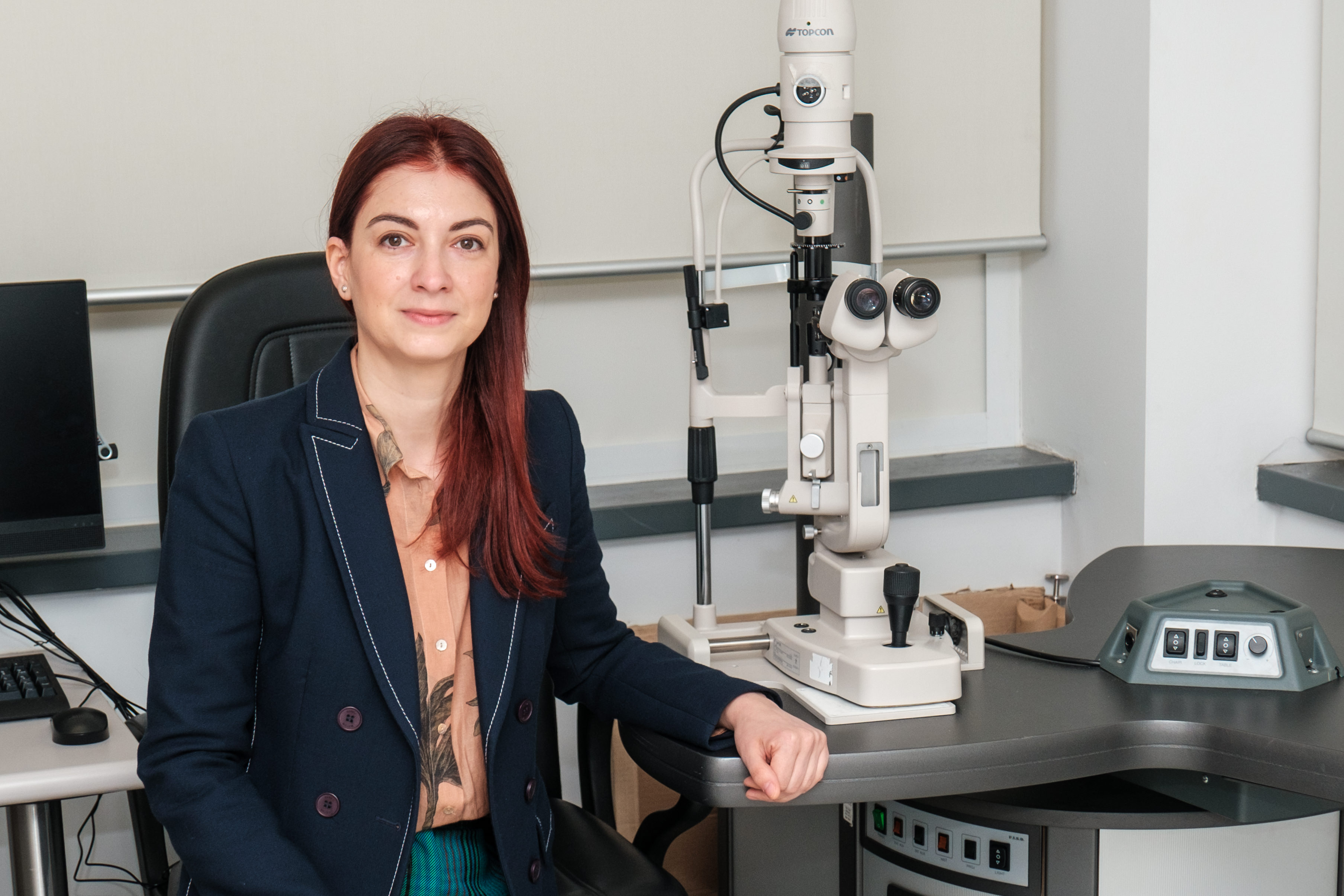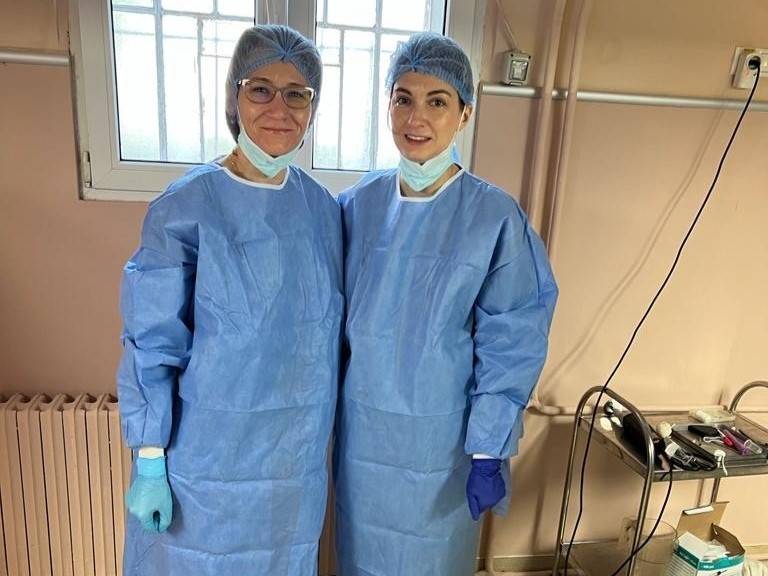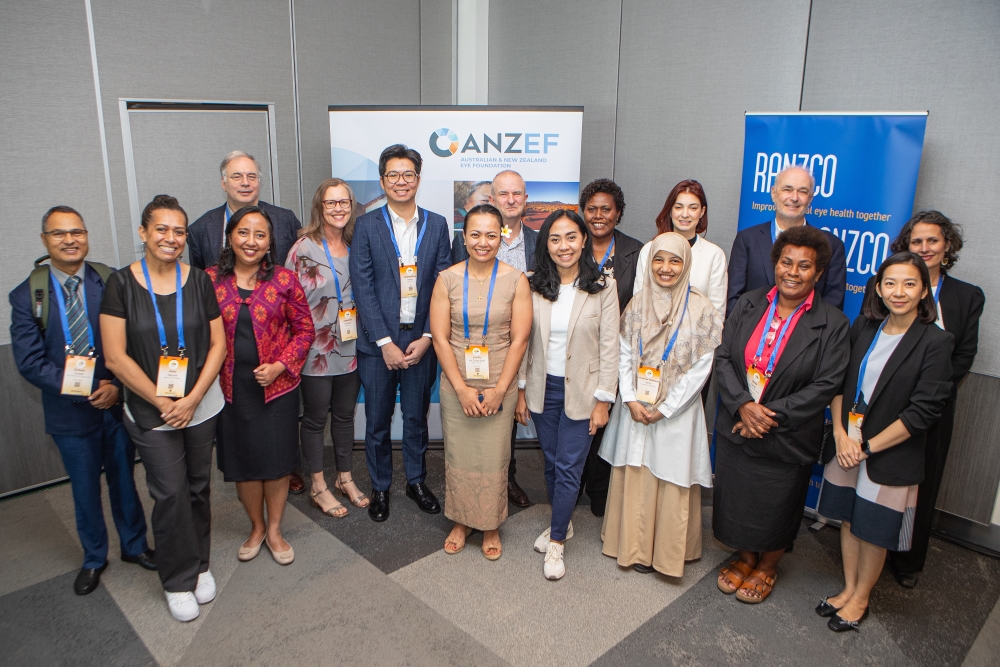When Dr Alexandra Manta was a young medical student in Romania, a professor showed the class two videos demonstrating cataract surgery. In the first, filmed in 1917, the entire lens and its surrounding capsule were removed in one piece through a large corneal incision. The second video showed a modern surgery, where only two tiny incisions and a small artificial lens implant were needed to restore sight.
The stark difference between the surgeries, demonstrating the lower risk, faster recovery and better vision outcomes now possible, inspired the young student.
“After watching those videos, I said ‘This is what I want to do’,” Dr Manta says.
Fast forward a few years and the skilled oculoplastic clinician now channels her passion for saving sight into research and education with the Queensland Eye Institute. However, this current role is only one chapter in a professional journey spanning three continents.

The journey to Queensland Eye Institute
After graduating from medical school and starting ophthalmology training in Romania, Dr Manta did more specialist training in the United Kingdom at Moorfields Eye Hospital and in the United States at the Stein Eye Institute UCLA. Later, Professor Timothy Sullivan, a world expert in oculoplastic surgery, selected her for a fellowship at the Royal Brisbane and Women’s Hospital and Queensland Children’s Hospital.
Dr Manta had intended to return to Romania when that fellowship finished, but fell in love with Brisbane and chose to make a life here instead. That decision put a kink in her career trajectory, as she can’t practise the sub-specialty surgery she’s trained for until her overseas qualifications are ratified.
Australia’s process for registering international medical graduates is rigorous, expensive and takes a long time. Many overseas trained doctors working with limited registration struggle to find suitable positions and stop practising medicine, or in some cases, leave the country.
Dr Manta says if she’d been forced to stand still while she navigated the registration process, she’d have gone into a “deep depression”.
Currently, Dr Manta’s registration allows her to practise in a limited fashion. With the support of QEI clinicians, she continues to operate under supervision at the Princess Alexandra Hospital, The Mater Hospital and at the South Brisbane Day Hospital.
But Dr Manta wanted to do more than bide her time while she satisfies Australian registration requirements.
“I wanted to fill this big gap in my clinical career with something productive and something useful, and also something that I can learn from,” Dr Manta says.
Fortunately, the Queensland Eye Institute (QEI) could also offer Dr Manta a position in its research team, providing her with meaningful career opportunities while she obtains Australian registration, a process which could take three years to complete.
Commitment to research
Dr Manta’s academic fellowship at UCLA’s Stein Eye Institute sparked an interest in scientific and clinical research. She saw how her mentors, Professor Robert Goldberg and Dr Daniel Rootman, were deeply committed to collecting data and auditing their surgeries to improve ophthalmology treatments.
“We had research meetings every couple of weeks where all the consultants, the fellows and the residents would sit together in a room and just bounce ideas about gathering data and exploring new techniques,” Dr Manta says.
“Studying throughout life, documenting what you’re seeing and how your surgeries go. That’s what these people did constantly,” she says.
Dr Manta’s research experience at the Stein Eye Institute and later with Professor Sullivan at the Royal Brisbane and Women’s Hospital gave her the skills and experience to follow her own research interests.
Dr Manta now works closely with QEI’s Chief Scientist Professor Traian Chirilla. She contributes to QEI research projects assessing the pathophysiologic involvement of collagen in eyelid laxity disorders and leads a project studying the effect of downregulation of IGF-1R expression in orbital fibroblasts derived from patients with thyroid eye disease through genome editing. She’s also involved in QEI clinical trials testing new treatments for thyroid eye disease.

Teaching too
As well as her surgical and research commitments, Dr Manta teaches. In 2023 she developed an oculoplastic and orbital dissection course and a seminar teaching safe practices in facial rejuvenation. Both events included presentations by Dr Manta’s mentors from the United Kingdom and the United States, all leading experts in these fields.
Dr Manta also convenes regular oculoplastic teaching and research focus group meetings for medical residents, principal house officers and registrars at the Queensland Eye Institute.
She contributes to global eye health, including an initiative supporting health professionals from smaller Asian and Pacific nations through mentoring and training, which increases local capacity for diagnosis, treatment, and care.

Giving back
Dr Manta credits another mentor from her time at Moorfields Eye Hospital, Miss Michèle Beaconsfield, for inspiring a commitment to mentoring the next generation of ophthalmologists.
“She was one of the few female oculoplastic specialists at Moorfields and she had a very motherly way about her,” Dr Manta says.
“She gave us more than clinical training. She also gave life teachings. I call her my fairy godmother.
“I’m very much into education and talking to my colleagues,” Dr Manta says.
“It’s very important to not only inspire professionalism in your colleagues, but also to ensure they know that you’re a nice person that they can rely on and ask for advice later on in their career.”
View Dr Alexandra Manta’s QEI profile here
Learn more about the Queensland Eye Institute at these links:
Research
Clinical Trials
Foundation
Supporting QEI Foundation
Queensland Eye Institute Foundation is Queensland’s largest independent academic research institute devoted to eye-related health and diseases and with your help, we can work towards new treatments and cures. At QEIF our mission is to reduce eye disease, improve eye health, and ultimately eliminate preventable blindness in the community. With no government funding, QEIF’s survival relies solely on the generosity of donors.